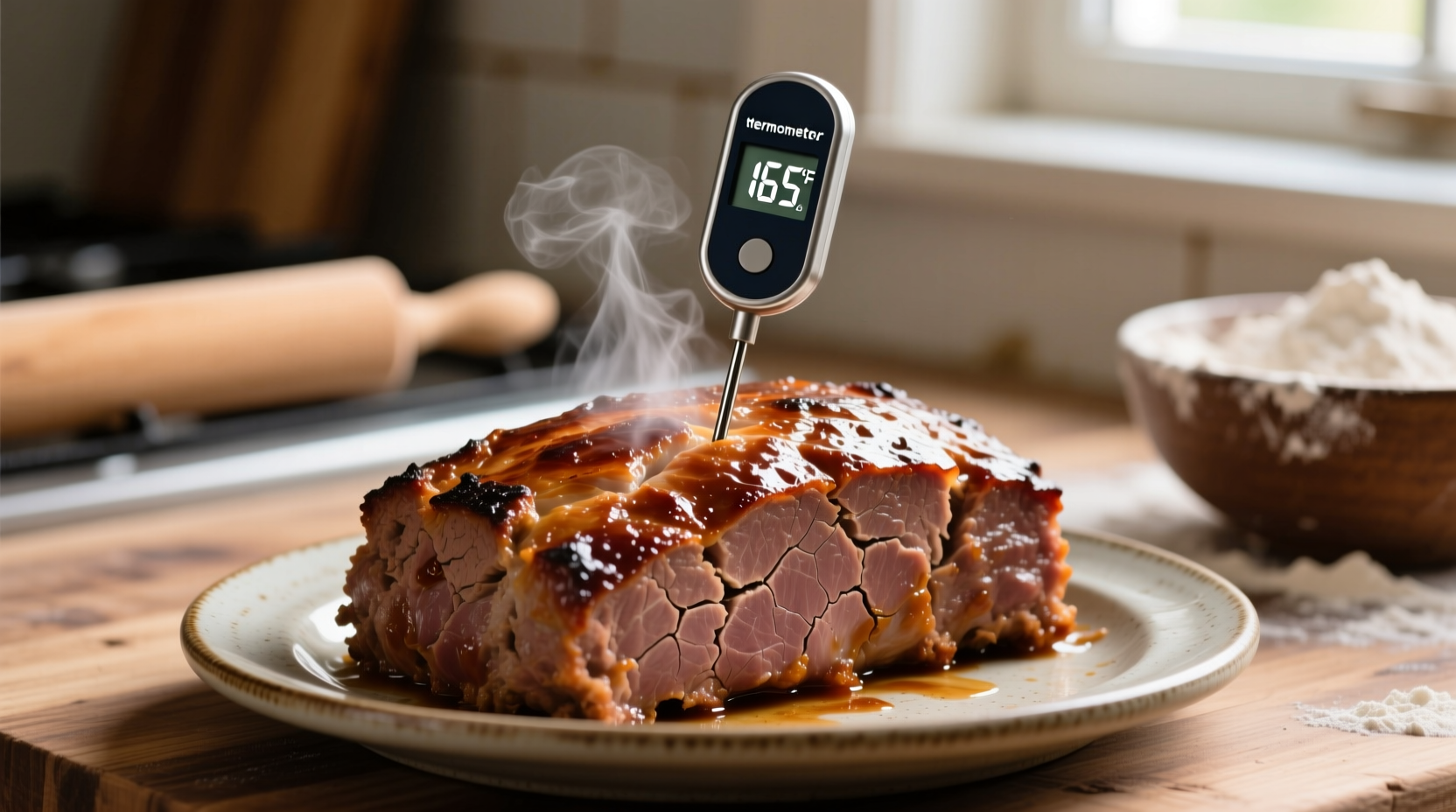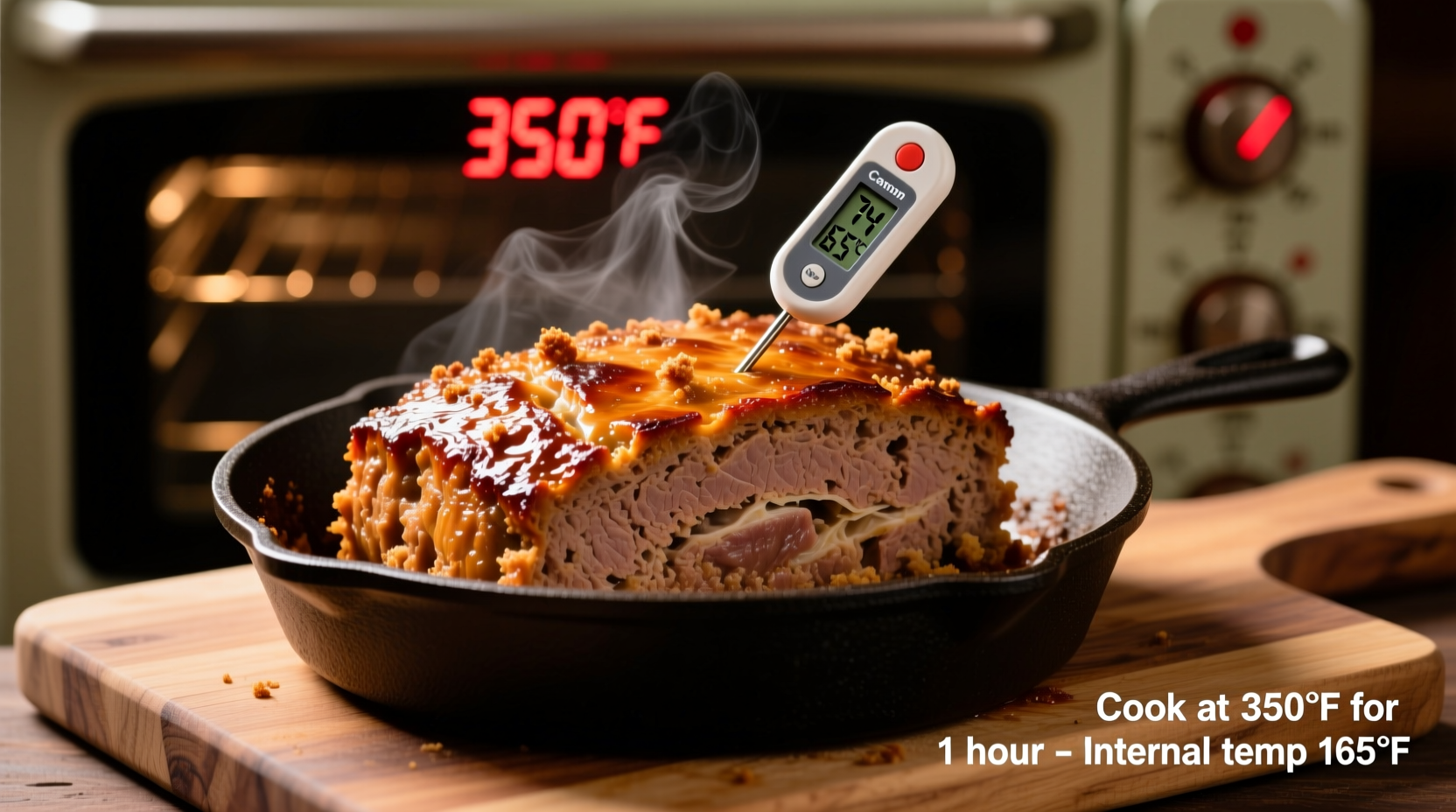Nothing beats the comforting aroma of a perfectly cooked meatloaf filling your kitchen. But getting that ideal texture—moist but firm, fully cooked but not dry—requires precise timing and temperature control. As a home cook, you've probably wondered: how long to cook meatloaf at 350°F to achieve restaurant-quality results without risking food safety?
Why Temperature Matters More Than Time
While most recipes provide time estimates, the USDA Food Safety and Inspection Service emphasizes that internal temperature—not cooking duration—is the only reliable indicator of doneness for ground meats. Undercooked meatloaf can harbor harmful bacteria like E. coli and Salmonella, while overcooked meatloaf becomes dry and crumbly.
According to the USDA Food Safety Guidelines, ground meats must reach 160°F (71°C) to eliminate pathogens. This critical food safety threshold should guide your cooking process more than any timer.
| Meatloaf Size | Approximate Cooking Time at 350°F | Target Internal Temperature |
|---|---|---|
| 1.5 lbs (standard loaf pan) | 40-50 minutes | 160°F |
| 2 lbs (most common size) | 50-60 minutes | 160°F |
| 2.5+ lbs (large family portions) | 65-75 minutes | 160°F |
Your Step-by-Step Meatloaf Cooking Process
Preparation Essentials
Before you even preheat your oven, ensure your meatloaf mixture includes these critical elements:
- Proper binder ratio: 1/4 to 1/2 cup breadcrumbs or oats per pound of meat prevents crumbling
- Moisture balance: 1 egg per pound of meat plus 2-3 tablespoons of milk or broth
- Temperature consistency: Mix ingredients with cold hands to prevent fat from melting prematurely
Monitoring During Cooking
Set your timer for 40 minutes, then begin checking the internal temperature every 5-7 minutes thereafter. Insert your thermometer into the center of the loaf, avoiding contact with the pan. Remember that meatloaf continues cooking during resting time, so remove it from the oven when it reaches 155-157°F.

Context Boundaries: When Standard Timing Doesn't Apply
Several factors can significantly alter your meatloaf cooking time at 350 degrees, requiring adjustments to standard timing:
- Loaf pan vs. free-form loaf: Free-form loaves on a baking sheet cook 10-15 minutes faster than those in loaf pans
- Ingredient composition: High-moisture ingredients like mushrooms or zucchini extend cooking time
- Oven calibration: Home ovens often vary by 25°F—use an oven thermometer for accuracy
- Starting temperature: Chilled mixtures require 10-15 minutes longer than room-temperature mixtures
Visual Doneness Indicators (When Thermometer Isn't Available)
While a thermometer remains essential for food safety, these secondary indicators confirm proper cooking:
- Juices run clear, not pink, when pierced with a fork
- Top surface appears firm and slightly shrunken from pan edges
- Loaf springs back when gently pressed (not soft or squishy)
Troubleshooting Common Meatloaf Issues
Problem: Meatloaf is still pink inside at 160°F
This occurs with certain ingredients like tomato paste or Worcestershire sauce that retain pink color. Always trust your thermometer over visual cues—pink doesn't necessarily mean undercooked when proper temperature is reached.
Problem: Meatloaf falls apart when slicing
Common causes include insufficient binder, overmixing, or slicing too soon. Allow meatloaf to rest 10-15 minutes after cooking—this crucial step lets proteins reabsorb juices and firm up for clean slicing.
Perfecting Your Meatloaf Technique
Professional chefs use these advanced techniques to elevate their meatloaf:
- Temperature ramping: Start at 400°F for 15 minutes to develop crust, then reduce to 350°F
- Water bath method: Place loaf pan in larger pan with 1 inch of hot water for more even cooking
- Glaze timing: Apply ketchup-based glazes during the last 15-20 minutes to prevent burning
For those experimenting with how long to cook meatloaf at 350 degrees with alternative ingredients, remember that turkey or chicken meatloaf requires slightly higher internal temperature (165°F) due to different food safety considerations.
Resting and Serving for Best Results
Resist the temptation to slice immediately! Resting for 10-15 minutes allows:
- Temperature equalization throughout the loaf
- Juice redistribution for maximum moisture retention
- Structural setting for clean, attractive slices
Cover loosely with foil during resting to maintain warmth without creating steam that softens the crust.











 浙公网安备
33010002000092号
浙公网安备
33010002000092号 浙B2-20120091-4
浙B2-20120091-4